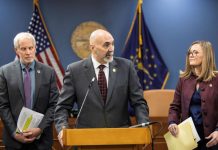In an op-ed published first at IndyStar.com, Attorney General Todd Rokita celebrates the role of religious liberty in the lives of Hoosiers and all Americans.
Attorney General Rokita writes: “There’s a reason religious liberty is the ‘first freedom’ mentioned in the Bill of Rights. As Thomas Jefferson said in 1809, ‘No provision in our constitution ought to be dearer to man than that which protects the rights of conscience against the enterprises of civil authority.’ â€
To preserve such liberties, however, Hoosiers “must be willing to fight for them,†he adds.
The 731-word op-ed, which follows below in its entirety, is available to any outlet that wishes to publish it. As a courtesy, please let us know if you publish this piece by emailing press@atg.in.gov.
A headshot of Attorney General Rokita is available for download.
***.
An April reflection: We must fight to preserve religious liberty
By Indiana Attorney General Todd Rokita
April is a month of religious observances. Christians celebrate Palm Sunday, Good Friday and finally Easter, when we give thanks for the risen Christ. During Passover, our Jewish friends commemorate the Israelites’ liberation from slavery and deliverance from Egypt.
But all year long, at different times and in different ways, people of many different traditions celebrate the foundational role of faith in our lives.
Quite apart from the formal festivals and rituals, we Americans practice our faith across every aspect of our lives — at home, at school, at work and everywhere we go.
Here in America, we enjoy a rich heritage of religious liberty. We are free to live out our deeply held beliefs in whatever ways we deem appropriate so long as our conduct does not threaten the legitimate rights of others. The government may not establish a state or national church.
This is what the First Amendment promises.
And there’s a reason religious liberty is the “first freedom†mentioned in the Bill of Rights.
As Thomas Jefferson said in 1809, “No provision in our constitution ought to be dearer to man than that which protects the rights of conscience against the enterprises of civil authority.â€
But these liberties are constantly under attack. To preserve them, we must be willing to fight for them.
As Indiana’s attorney general, that’s exactly what I have been doing with a great team of talented lawyers who serve with servants’ hearts.
On April 25, the U.S. Supreme Court is scheduled to hear oral arguments in a case pertaining to these very issues.
The case arose in Bremerton, Wash., where Coach Joe Kennedy habitually knelt in quiet prayer for a few moments after each game. Then several players began joining him, huddling at the 50-yard line.
The motivation for his prayer, Kennedy once explained, was: “God, I’m going to give you the glory after every game, win or lose.â€
But as more players began kneeling with Kennedy, someone complained — and the Bremerton School District asked Kennedy to stop the prayers.
When Kennedy insisted on following his conscience, the district placed him on administrative leave and did not renew his contract.
So far, lower federal courts have rejected Kennedy’s pleas to affirm his constitutional rights to engage in the on-field prayer.
But now the U.S. Supreme Court has agreed to hear the case.
On behalf of Hoosiers, I’m standing with 26 likeminded attorneys general imploring the justices in an amicus brief to state loud and clear that in America we have the absolute right to voluntary prayer.
I am also working to protect religious liberty right here in Indiana.
This year, in two separate cases, I am defending the rights of the Roman Catholic Archdiocese of Indianapolis to uphold church doctrine on same-sex marriage at Catholic schools.
One case involves an educator dismissed from Cathedral High School after he married another man, and the other involves a guidance counselor fired from Roncalli High School after she married another woman. Many religious schools consider their teachers and counselors to essentially hold ministerial roles.
In the first case, I filed a brief with the Indiana Supreme Court. In the second, I led a 16-state brief filed with a federal appeals court.
The message of each brief is basically the same: It is up to the Catholic Church, not the courts, to determine Catholic doctrine.
As a Catholic myself, I certainly encounter those who disagree with our views on marriage. I have met folks who consider odd, for example, the idea that priests and nuns are expected to be unmarried and celibate. Well, they have the right to their views — but we also have the right to ours. And I would fight equally as hard to defend any other faith in the same situation. In fact, the question we should ask is why aren’t groups like the ACLU also fighting to defend this constitutional right?
We must remember that the framers of the Constitution sought to protect religion from government, not to protect government from religion.
Without exaggeration, we can describe the origins of religious liberty as uniquely American. To again quote Jefferson, it is “a liberty deemed in other countries incompatible with good government and yet proved by our experience to be its best support.â€
During this season of Easter and Passover, may we each commit to doing our part to protect the freedoms we cherish so much.




